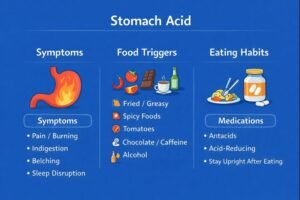Stomach Acid & Digestive Comfort: Causes, Symptoms & Awareness

Stomach acid plays an important role in digestion, helping break down food and support nutrient absorption. Concerns arise when stomach acid becomes excessive or moves upward into the esophagus (commonly experienced as heartburn or indigestion). This may lead to appetite changes, sleep disruption, belching, and discomfort.
Workplace & Canadian first aid relevance
Digestive discomfort is common and can affect workplace concentration, breaks, and eating routines. Public-health awareness around stomach acid helps individuals recognize triggers, adjust habits, and know when to seek guidance from a healthcare professional.
Scenario: Workplace lunchtime discomfort
After a spicy lunch, an employee noticed heartburn during an afternoon meeting and found it more noticeable when leaning forward. They switched to a lighter snack the next day and elevated their torso when resting after meals, which reduced symptoms. They later spoke with a clinician about ongoing digestive concerns.
Common symptoms linked to excess stomach acid
Symptoms vary, but may include:
-
Burning feeling in the chest or upper abdomen
-
Indigestion or belching
-
Decreased appetite
-
Sour taste in the mouth
-
Sleep disruption due to discomfort
These symptoms may come and go and may be influenced by diet, stress, or body position.
Food-related triggers (individual variability)
Certain foods and drinks may contribute to heartburn or acidity for some people, including:
-
Fried or greasy meals
-
Spicy foods
-
Tomatoes and citrus
-
Chocolate
-
Caffeine
-
Alcohol
-
Peppermint (may relax the lower esophageal sphincter)
Triggers differ widely between individuals, and some people notice no effect at all.
Eating habits & meal timing
Some healthcare professionals recommend:
-
Smaller, more frequent meals rather than large portions
-
Avoiding heavy meals right before bedtime
-
Allowing time to digest before lying down
These approaches may help reduce discomfort for some individuals.
Body position & post-meal strategies
Remaining upright after eating may reduce the chance of acid moving upward. When lying down, slight torso elevation may support comfort for people who experience nighttime symptoms.
Weight considerations (non-judgmental)
Higher abdominal pressure can contribute to upward movement of stomach contents in some individuals. Guidance about weight management is often framed around comfort, mobility, and overall health rather than appearance.
Medication awareness (non-prescriptive, non-branded)
Several over-the-counter and prescription options exist for managing stomach acid, including:
-
Antacids (neutralize existing acid)
-
Acid-reducing medications (decrease acid production)
-
Longer-acting acid suppression options
Suitability depends on health status, frequency of symptoms, and clinician recommendations. Individuals with persistent symptoms or uncertainty about options can discuss them with a healthcare professional.
FAQ
Is occasional heartburn common?
Many people experience it occasionally. Frequency, severity, and associated symptoms help determine when assessment is useful.
Does stress affect digestion?
Stress can influence eating patterns, muscle tension, and digestive function for some people.
Are certain foods always “bad” for stomach acid?
No. Foods vary widely in how they affect individuals. Identifying personal triggers is more practical than strict lists.
Can lifestyle changes make a difference?
Some people notice improvement with meal timing, posture, or identifying triggers. Others may require medical evaluation.
Educational note
This post supports public education about digestive comfort and stomach acid awareness. Persistent, frequent, or concerning symptoms may warrant assessment by a qualified health professional.
